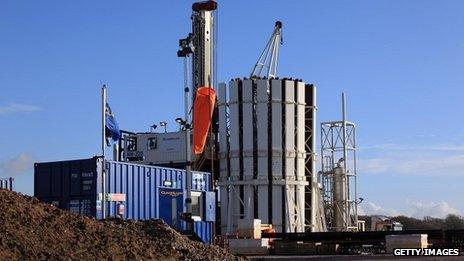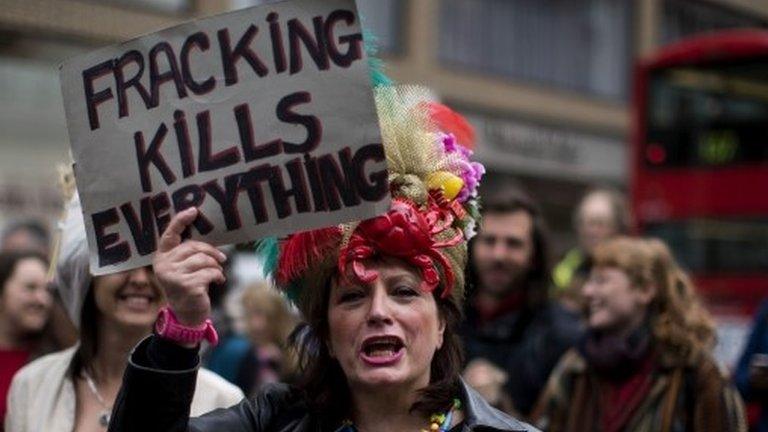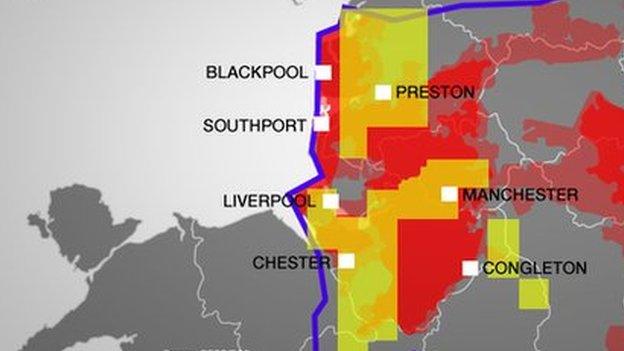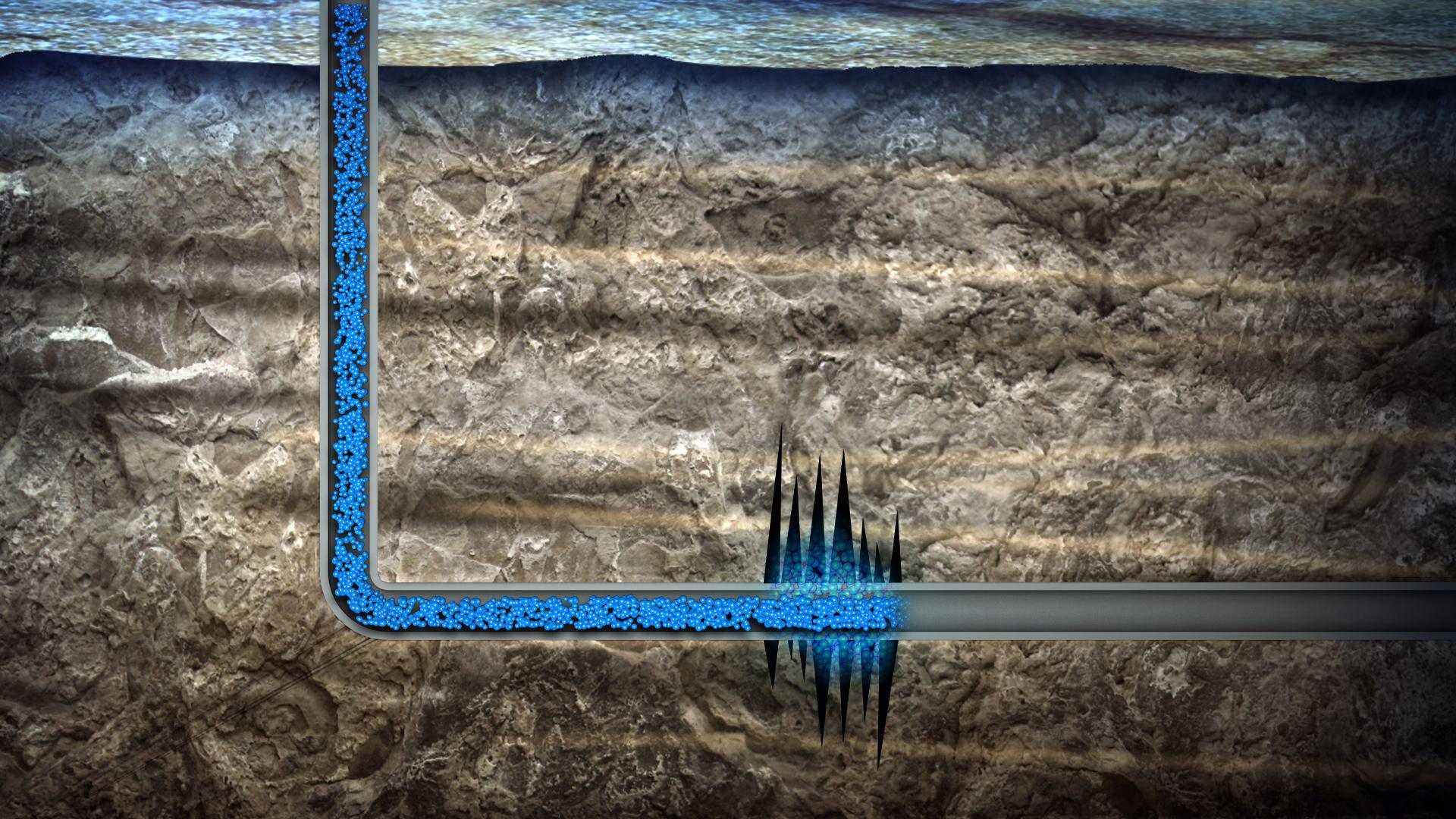UK looks to boost fracking with new land access rules
- Published
- comments

There has been a lot of local opposition to shale gas test wells
The UK government has proposed new rules regarding rights to access land in a bid to speed up the introduction of fracking.
It proposes that shale oil and gas companies are granted access to land below 300m from the surface.
It also suggests firms pay £20,000 per well to those living above the land.
The consultation comes as a new report by the British Geological Survey (BGS) estimates there are 4.4bn barrels of oil in shale rocks in southern England.
The BGS estimates there are between 2.2 billion and 8.6 billion barrels of shale oil in the Weald Basin - that covers areas including Sussex, Hampshire, Surrey and Kent - but says there is "no significant gas resource".
These figures represent the total amount of oil in the rocks, only some of which can be accessed.
"It is not known what percentage of the oil present in the shale could be commercially extracted," the survey said.

'Opportunities'
Announcing the government proposals, Energy Minister Michael Fallon said: "Britain needs more home-grown energy.
"Shale development will bring jobs and business opportunities.
"We are keen for shale and geothermal exploration to go ahead while protecting residents through the robust regulation that is in place.
Is it legal to frack beneath your house?
"These proposals allow shale and geothermal development while offering a fair deal for communities in return for underground access at depths so deep they will have no negative impact on landowners."
The new proposals do not affect the existing system for gaining access rights to land on the surface.
The government also proposed a new notification system to ensure local communities are well informed about any shale developments in their area.
The £20,000 would be an additional payment on top of the £100,000 per site already announced, and is specifically designed for those living above horizontal pipes under ground. Shale exploration companies have already committed to giving 1% of revenues from any successful wells to local communities.
But the government has not gone far enough in its proposals for compensating local residents, according to Sir Merrick Cockell, chairman of the Local Government Association.
"Given the significant tax breaks being proposed to drive forward the development of shale gas and the likely returns, payments to communities should be more in line with those across the rest of the world and be set at between 5%-10% of revenues," he said.
Fracking
The BBC's John Moylan said the report's estimates could have implications for the UK's long-term energy security and kick-off a drive to start fracking for oil in the region.
But he said the report suggests the shale rocks may contain less oil than similar formations in the US, where fracking has proved hugely successful in recovering oil and, particularly, gas. They could also be more difficult to frack.
Prof Robert Gatliff of the BGS told a news conference that the Weald could prove to be a "difficult play" for for the fracking industry.
Andrew Aplin, professor of unconventional petroleum at Durham University, also raised questions about how much of the oil could be extracted.
"Since neither the rock nor the oil is of optimal quality in the Weald, we might estimate that 1% of the Weald oil resource might be recoverable.
"This would equate to 0.05 billion barrels, which is about two months' UK consumption."
By way of comparison, the equivalent of around 45 billion barrels of oil has been extracted from the North Sea over the past 40 years.
Last year, a BGS study of the North of England suggested there could be as much as 1,300 trillion cubic feet of gas contained in shale rocks.
The fracking process involves pumping water, sand and chemicals into rock at high pressure, and it has sparked demonstrations by environmentalists. Some governments have banned the process.
Critics argue that fracking contaminates water supplies and can cause earthquakes. There have been strong anti-fracking protests at Balcombe, West Sussex, against test-drilling.
However, a government report published in June 2012 concluded that fracking was safe if adequately monitored.
Politically sensitive
Prime Minister David Cameron has insisted fracking will be "good for our country" and has blamed a "lack of understanding" of the process for some of the opposition.
For many years, there has been more traditional exploration and development of oil and gas in the region.
Andrew Austin, chief executive of the onshore energy company IGAS, said it had long been known that southern England had extensive resources.
He told the BBC: "We've known that there's a big potential for oil and gas explorations across the country but particularly in terms of oil in the Weald Basin.
"There's been a long history of oil and gas exploration in this area. We as a company produce oil and gas from around 20 sites across that area. Around 40 million barrels have been recovered from that area to date."
In the US, fracking for oil and gas has created an energy boom and led to speculation that the country could overtake Saudi Arabia as the world's biggest producer by 2020, or even sooner.
Gas prices in the US have fallen sharply as a result, and other countries are now hoping that shale oil and gas could also lead to lower domestic energy prices.
- Published22 May 2014
- Published20 May 2014

- Published24 February 2014

- Published16 July 2013
